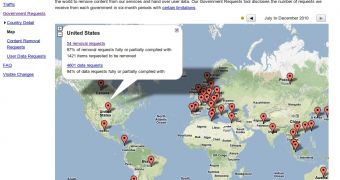More than a year ago, Google started releasing data about government requests it received, every six months or so. Now, it's providing the latest update, with data covering July to December 2010, and is also providing more information on the requests, what was their motivation, how many times Google complied and so on.
"Our Transparency Report discloses the information that governments have asked for over the past six months... we wanted to improve the way we give you the information, so we’ve updated the look of the report and added more details," Matt Braithwaite, Transparency Engineering at Google, announced.
The bi-yearly report showcases the number of data requests Google gets from governments and law enforcement agencies around the world. Until now, only the number of requests was available, an indicator of which countries used the method the most, but not very informative.
With the latest report, more details are available. For example, Google breaks down the requests by products and indicates whether it was a court order or a police request, and also the number of items removed.
"We've highlighted some significant changes in the data and provided context about why those changes may have occurred during this reporting period," Google added.
"We’ve also made it easier for you to spot trends in the data yourself. For example, we’ve changed the format so you can now see data on a country-by-country basis," it explained.
"We’re also clearly disclosing the reasons why we’ve been asked to remove content—such as an allegation of defamation or hate speech," it added.
Unsurprisingly perhaps, the US leads the way, by a fair margin, in the number requests, 4601. It also has one of the largest percentages of compliance, 94 percent of requests were granted.
Brazil comes in second with 1804 requests, followed by India with 1699 requests and the UK with 1162. Google is one of the few companies that discloses this type of data, though all internet companies likely get the same level of requests. Twitter is one of the very few to frequently challenge requests, giving users notice and a chance to challenge the requests.

 14 DAY TRIAL //
14 DAY TRIAL //